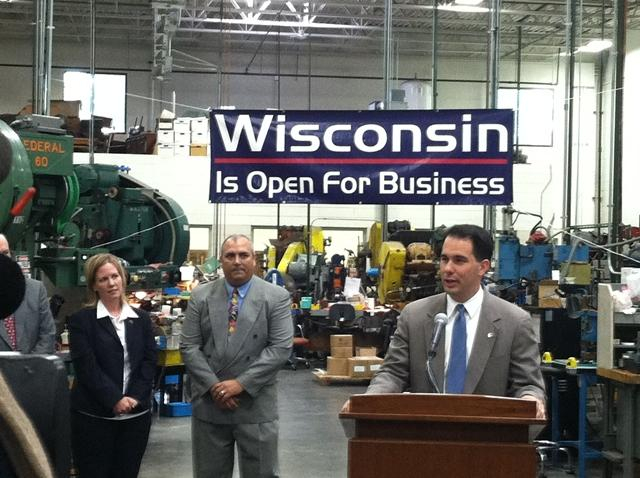State Jobs Engine Running at Half Speed
Wisconsin trails the nation, needs comprehensive economic development program.
Wisconsin will hit Gov. Walker’s first term target of 250,000 added jobs, but it will take two terms to do it.
The goal required 62,500 jobs per year, but the state has been growing at roughly 1% or 30,000 jobs per year. That compares to average growth of about double that across the country.
So the state is lagging, and it is lagging because its two major metro areas are lagging. Over the last 12 months, the four-county Milwaukee metro area actually lost about 1000 jobs, ranking at the bottom for 50 metro areas. And, the metro Madison area only grew by .7%, or 3000 new jobs, despite the presence of a flagship university campus and the home of state government.
The slow job growth means that even though the Wisconsin unemployment rate has dipped to 4%, state leaders have more work to do on job creation. They can’t declare victory.
Gov. Walker and his GOP allies have taken big steps to improve the business climate, including a big tax break for the legacy economic bases of manufacturing and agri-business, a right-to-work law and major deregulation. That and the resurgence of the national economy have helped Wisconsin to regain moderate growth.
But what to do next? The best bet might be to bet on the economic regions of the state. They are closer to the action than the experts in the capitol. The last two governors have run tight ships, with most of the shots being called by a tight circle of staffers. Cabinets and top legislative leaders have been supportive. But, with the exception of right-to-work, the major parts of the political agenda have come out the governors’ offices, sometimes as a surprise like Act 10.
In contrast, the eighteen counties in northeastern Wisconsin have organized themselves in NEW North to get all their educational institutions into alignment on workforce training needs. Led by UW – Oshkosh and UW – Green Bay, they have pulled the technical colleges and K-12 districts into a K-20 compact to cooperate with industries to make sure their training is just where the open jobs are.
Reorganizing the University of Wisconsin System, along regional lines would accelerate that positive approach. There is great support on both sides of the aisle to put more resources into training, a rare of bipartisanship, but a Madison-centric system is not the way to go.
There is a head of steam from Speaker Robin Vos and President-elect Donald Trump to increase investments in road upgrading. That could be a stimulus in the short and long term, if their programs don’t escalate government debt at both levels.
A no-brainer for revving up the economy is to get even more serious about high-growth startups. Entrepreneurs generate most net new jobs. Almost all our great employers started in the state. Conclusion: we need more startups.
Fixing health care costs could put several thousand dollars in every home in Wisconsin. Private payers are already driving down bloated health care costs. The state could lead the way by doing the same with its 65,000 employees.
This is a partial list of ways to stimulate job creation and increase the state’s prosperity. Our leaders need to look at good-paying jobs as “a public good,” as one former Wisconsin economist put it, meaning it benefits the whole state in many ways, not just the jobholder.
One civic leader reminded us recently that without good jobs, no other social programs in education, health or public safety work well.
The state lacks a comprehensive economic development program. None has been done since the four economic summits of 2000-2003, led by the University of Wisconsin, and the Be Bold task force of 2010, led by major stakeholders in the state.
With the state running at half speed on job creation, and the Republicans in complete control of out statehouse, maybe it’s their turn to come up with one.
John Torinus is the chairman of Serigraph Inc. and a former Milwaukee Sentinel business editor who blogs regularly at johntorinus.com.
Op-Ed
-
Wisconsin Candidates Decry Money in Politics, Plan to Raise Tons of It
 Dec 15th, 2025 by Ruth Conniff
Dec 15th, 2025 by Ruth Conniff
-
Trump Left Contraceptives to Rot; Women Pay the Price
 Dec 8th, 2025 by Dr. Shefaali Sharma
Dec 8th, 2025 by Dr. Shefaali Sharma
-
Why the Common Council’s Amended Budget is Good Policy for Milwaukee
 Nov 20th, 2025 by Alds. Marina Dimitrijevic and Russell W. Stamper, II
Nov 20th, 2025 by Alds. Marina Dimitrijevic and Russell W. Stamper, II




















“Gov. Walker and his GOP allies have taken big steps to improve the business climate, including a big tax break for the legacy economic bases of manufacturing and agri-business, a right-to-work law and major deregulation.”
And where has all that gotten us? Tax cuts and weaker regulations doesn’t lead to robust economic growth. This does: “Blue states dominated by Democrats do much more to maintain their investments in education, infrastructure, urban quality of life and human services — investments typically financed through more progressive state and local taxes.” http://www.nytimes.com/2016/07/31/opinion/campaign-stops/the-path-to-prosperity-is-blue.html
So tell your buddies John.
Odd use of highly selective data to downplay how important Dane County and SE Wisconsin are to growth in Wisconsin. Instead of looking at just the past 12 months, if this had quoted the long-term figure it shows where the real growth is happening in the state. These are the top 5 counties for total number of jobs added between 2011 Q2 and 2016 Q2, along with the percent growth (data coming from the quarterly economic census available on DWD web site):
Dane – 30,188 jobs added, up 10.1%
Waukesha – 15,430, 6.9%
Milwaukee – 14,466, 3.1%
Kenosha – 9,066, 17.0%
Brown – 8,120, 5.6%
These five counties combined account for more than half of the 161,000+ jobs added in Wisconsin from 2011-2016. Dane County alone accounts for more than Waukesha and Milwaukee combined.
John, how much did Walker/Vos/GOP pay you to write this swooning POS? Maybe if you help repeat it enough times, it will help it be true.
None of those grow jobs, John, those actions grow profits. In fact, lessening regulations will probably result in a net loss of jobs, and I’m not just talking about the DNR oversight scientist, though we could talk about that too. Let’s dream up a scenario real quick: Manure handling on uber dairy farms …They won’t even have to pay minimum wage to the skid loader operator to move the sh*t to the holding pit, they can just wait for it to rain and wash it over to the ditch.
Vincent, I’m not disagreeing, I like the reference to NYT article and the data they present, but it is worth calling them out on the (seemingly harmless) inclusion of “urban” in “… urban quality of life …”; this is exactly what got us Trump for President — rubs everyone “not urban” the wrong way and furthers confirmation biases.
Give it up John. You’ve been spewing bs and twisting the truth for your bud Walker for six years now. When are you going to tell the truth? Walker’s policies of starving education, vilifying teachers, cutting mass transit, and screwing workers while cutting taxes for the wealthy will not stimulate growth. If I were just getting out of college I’d head for one of the coasts and get out of Walker’s hell hole. Conservative economic and social policies suck.
The last time I visited family in Wisconsin all I saw was poverty, hopelessness, unemployment, alcoholism and obesity and some seriously high property taxes. Oh yeah, a whole lot of Trump signs too… It was an utterly depressing burned out hellscape. No thanks, I’ll stay in beautiful progressive Seattle, Washington with our #1 economy in the country, no income tax, awesome business environment for entrepreneurs, low property taxes, and invest heavily in the booming legal marijuana. Oh yeah, Milwaukee’s violent crime rate is triple Seattle’s, but Scott Walker says mare-i-juh-juana is bad. Reality proves him wrong. Enjoy the dark ages and total irrelevance Wisconsin. The modern world and global economy has moved on without you.
That’s all you saw? Did you manage to somehow only visit a single block? I bet even Seattle has poor people, homeless people, unemployed people, alcoholics, and obese people, and I could probably visit one block where all of that exists. It hardly tells the story of Seattle.
No I have lived there for over twenty years and started 3 businesses there. There is no comparison. Milwaukee and Wisconsin in general is a high tax, high crime, bad place for personal liberty and business. Seattle is the exact opposite and every single economic indicator prices it.